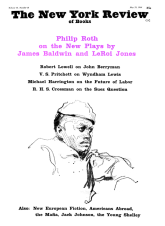In response to:
On Linguistics from the May 14, 1964 issue
To the Editors:
Will you please report a few errata in my Linguistics review in the issue of May 14?
On page 15, for the benefit of the uninstructed your editor wisely but inaccurately defined “phonemes” for me. A phoneme is what is analyzed as the smallest discrimination that could make a difference to being understood. Thus, a Spanish d would still be taken for d, so it is not a separate phoneme from d; but thin is different from sin, so a strong lisp is phonemically pathological. Also, a rising intonation is taken for a question rather than an assertion, so it is a separate phoneme. The gist of my review is that an accurate analysis—of phonemes, syntax, or anything else—is of the concrete whole that is being analyzed; since language finally exists in particular practical speeches, we cannot finally rely on mere averages, or matching pairs over short stretches with unconcerned listeners, or on fiat of what in a speech is linguistic and what is para-linguistic. Linguistic analysis is literary analysis.
On page 18, your copy-reader dropped a “not” in my sentence about Zellig Harris, which should read: “Is it not a bit of a hoax not to accumulate in parallel the vast treasury of ‘paralinguistic’ speech which also somehow communicates?”
Finally, on page 2, at the University of Wisconsin (Milwaukee) I am in the Department of Urban Affairs, not English.
Paul Goodman
Milwaukee, Wisconsin
This Issue
May 28, 1964



